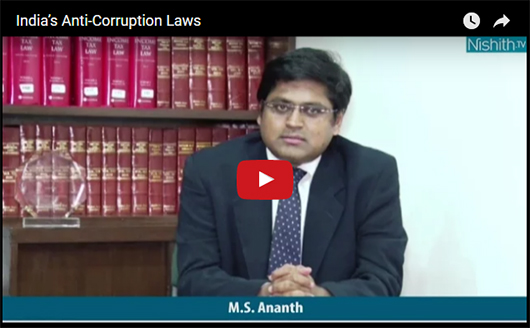|
|
A Comparative View of
Anti-Corruption Laws of India |
|
|
|
A Legal, Regulatory, Tax and Strategic Perspective |

|
| |
|
June 13, 2016
|
|
Our
Anti-Corruption
Practice Group is pleased to present
the above publication which can be accessed
by clicking on the
thumbnail. This publication introduces
the complete framework regarding laws relating
to corrupt practices in India. It is intended
to act as a broad legal, regulatory and
strategic guide to aid in decision making
process when deciding to invest, start,
supervise or carry on operations in India.
While Indian law relating to corrupt practices
is not as comprehensive as laws in other
jurisdictions, the publication seeks to
answer questions and issues commonly raised
by overseas investors while looking to enter
India or oversee operations in India. This
publication also has special reference to
foreign jurisdictions, including USA, UK
and Singapore and international standards.
Hope you have a good read.
For any help or assistance please email us on
anticorruption@nishithdesai.com.
Do visit us at
www.nishithdesai.com.
|
|
|
| |
|

|
 |
|
Key Points
|
-
India’s principal law relating to corrupt practices
is the Prevention of Corruption Act, 1988 (POCA),
which prosecutes the offence of receiving bribes
by public servants.
-
Offering of bribes is not ordinarily prosecuted
as the bribe-giver is given immunity when he
is the complainant.
-
POCA does not prosecute offences relating to
bribes in the private sector
-
POCA also does not provide for a measure to
settle offences (plea bargaining or compounding
of offences).
-
India does not have a law relating to public
procurement – the bill that was introduced in
2012 has since lapsed. Various ministries and
government departments follow a set of standardised
norms for public procurement and importantly,
the norms provide for blacklisting vendors.
-
India has a law in place for whistle blowers
– however, this too has limited application
and amendments have been moved to expand the
exclusion.
-
Consistent with international standards, tax
deductions are not allowed in respect of illegal
gratification. In certain circumstances, contributions
to political parties are permitted and deductions
in respect of the same are also allowed.
-
India’s laws relating to corrupt practices do
not provide for:
-
Action for damages by companies that have
suffered due to corrupt practices,
-
Action against Government due to corrupt
practices by public officials,
-
Prosecution for offering illegal gratification
to international officials,
-
Guidelines to help companies maintain standards
of integrity and probity in the administration
of a company,
-
India’s laws however provides for an active
role for Public Interest Litigation activists.
The Central Vigilance Commission and Comptroller
Auditor General play an important role in highlighting
deficiencies in the system which activists use
for the purpose of addressing /prosecuting corruption
in India.
Legal 500: Ranked in
Tier 1 for Investment Funds and International Taxation
Fastest Growing M&A
Law Firm in India in 2015: MergerMarket
The Most Innovative
Law Firm in Asia-Pacific

|
|
|
|
|
Nishith Desai Associates
announced ‘Most Innovative Law Firm in
Asia-Pacific’ by Financial Times
in its FT Asia-Pacific Innovative Lawyers
2016 report
Nishith Desai Associates
has been declared as the Most Innovative
Indian Law Firm (2015) at the Innovative
Lawyers Asia-Pacific Awards by the Financial
Times - RSG Consulting
|
| |
|
|
If you have passion
to change the world - for the better,
if you have flair for innovation, if
you have client centricity and obsession
to provide 'wow' service to them, if
you have extra-ordinary skill and enthusiasm
for research and writing, if you have
the urge to undertake challenging work,
if you are a risk taker and have long-term
goals, if you want to walk the extra-mile
to help the needy- And if you believe
we are not in the 'business of law'
but in the 'profession of law', please
write to
happiness@nishithdesai.com.
To learn more about
us
Click here.
|
|
|
